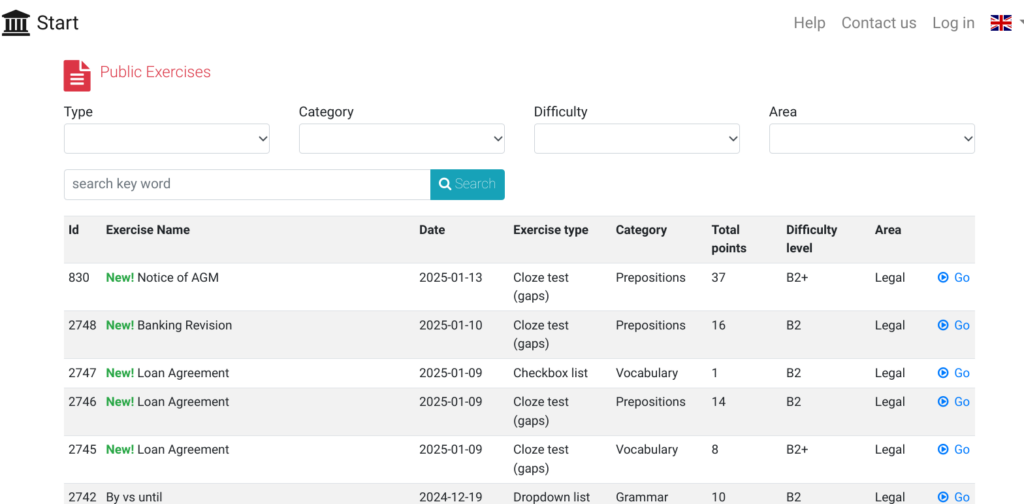Recommended Resources for Non-native English Speaking lawyers and law students + legal English instructors + anyone else interested in improving their legal English
Note: Have a suggestion to add to this page? Post in the comments below, or just email Stephen Horowitz at sh1643@georgetown.edu.
Guestbook: If you visit this page and find it helpful, please take a moment to say hi in the comments section below! It’s always great to connect with others interested in legal English.
Last updated: November 8, 2024
Legal English Resources in Ukrainian:

Legal English With Anastasia – A blog/Instagram feed in Ukrainian, focused on helping people with their legal English – https://www.instagram.com/legal.english.with.anastasiia?igsh=MWVwaGJvdWU4engzNA%3D%3D
- Quick, easy & free!
To start, a few resources that are free and easy to access. Just click the link below and you’re moving.
USLawEssentials videos on YouTube.
Short, semi-animated videos created by legal English professor Daniel Edelson on a wide range of topics, both general and specific. They’re very accessible and easy to follow and great for incorporating into your teaching if you’re an instructor or for students to study on their own.
USLawEssentials Law & Language Podcast
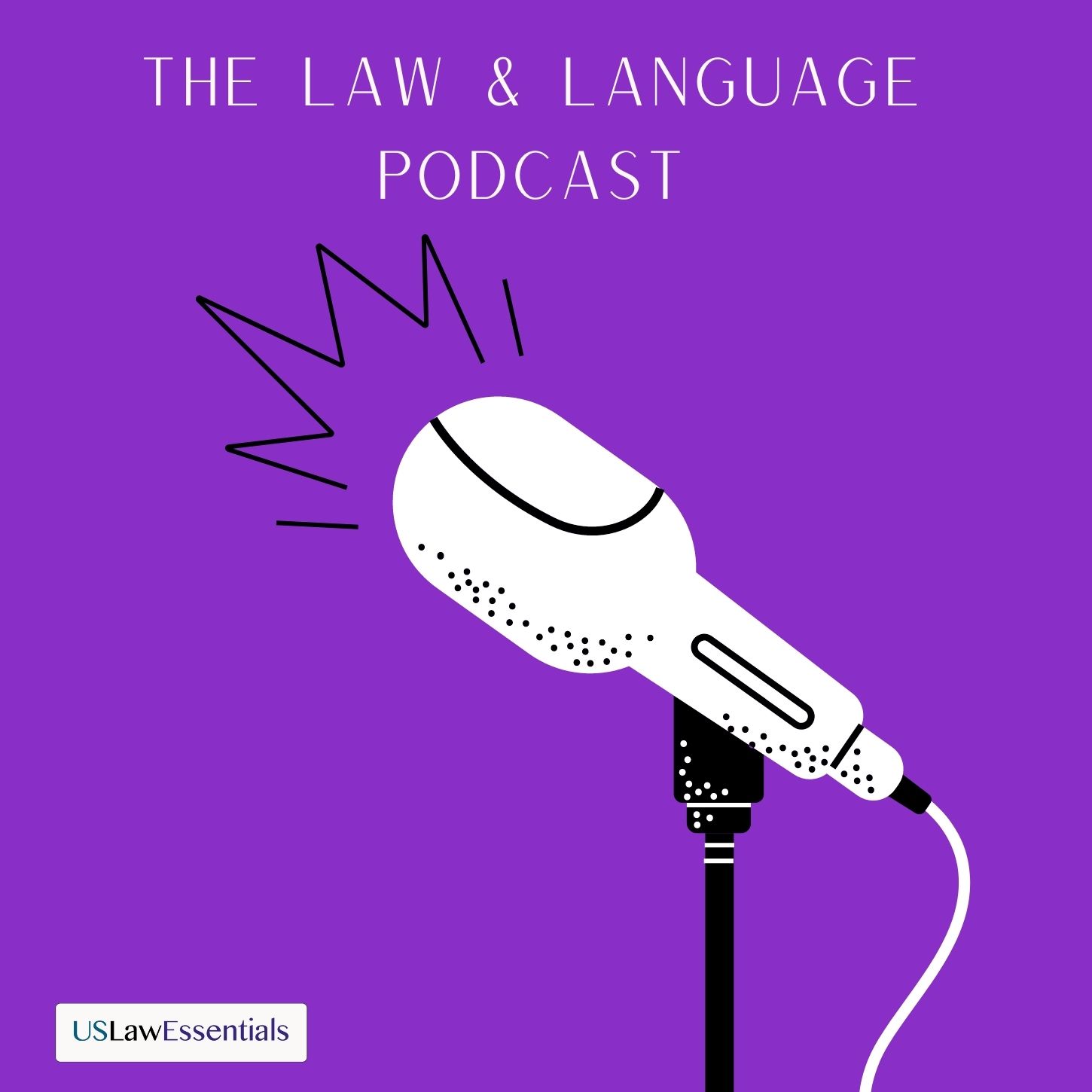
(In China, use this link or this link.) A podcast by Daniel Edelson and Stephen Horowitz created specifically to help non-native English speaking lawyers and law students improve their legal English. Episodes alternate between What’s New in the Legal News, Law Exam Essentials, and Multilingual Lawyer Interviews. Transcripts coming soon. USLawEssentials also offers online legal English courses.
For pronunciation help and listening practice, this is an amazing resource. You can type in any word or phrase, and it will pull up a bunch of YouTube videos queued right to where people in the videos are saying the word or phrase. And below it are large subtitles following the video in real time. After you hear it in one video, click forward and go to the next button.
Master of Laws Interviews Project– A series of interviews with LLM graduates about their career paths, ranging from BigLaw partners to senior counsel at multinational corporations, intended to be helpful to current and future LLM students who are seeking jobs or internship in the U.S. Part audio, part transcript, this project was conceived by Georgetown Law’s Prof. Yi Song, Executive Director of Graduate and International Programs at Georgetown Law and a graduate of Georgetown’s LLM program herself. Click here to receive FREE updates from the latest conversations at Master of Laws Interview Project.
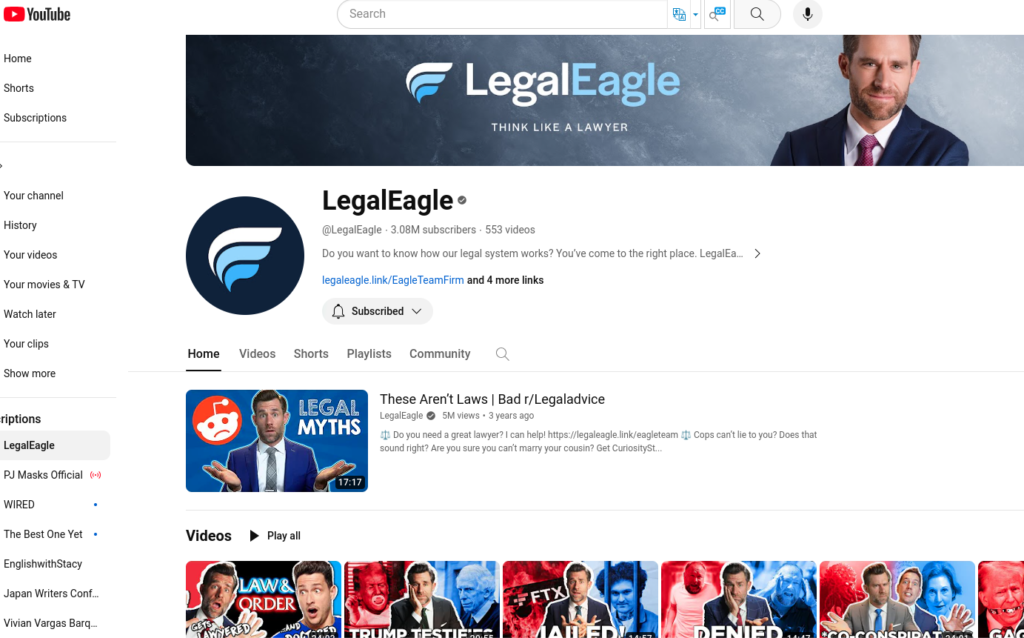
Legal Eagle and Legal Eagle Law School– Excellent up-to-date series of YouTube explainer videos on law and current events by a practicing litigator/influencer.
Pustulka Public Exercises List: A unique and amazing web-based app for learning and testing legal English, especially related to business law. Thank you to Dr. Aleksandra Łuczak, Director of the Language Centre at Kozminski University, who explained that she created the app a few years ago when she couldn’t find an ideal app for testing her law students, to whom she teaches legal English. She further explains, “Apart from its testing goal, Pustulka also has a collection of almost 400 free public exercises which can be found at the link above. Learners can also search for specific exercises by typing keywords in the search box, e.g. contract, company, director, clause, elements, employment, employer, solicitor, etc.”
(She also notes that “pustulka” is Polish for “kestrel.”)

Newsela.com – Perhaps the best resource for extensive reading on the internet. And you can register for free. It has a huge library of news articles (which is adds to daily) which are taken from actual news sites like Reuters and the Washington Post. Then it re-writes the article 4 times, each version easier than the previous version. Voila! Instant scaffolding!
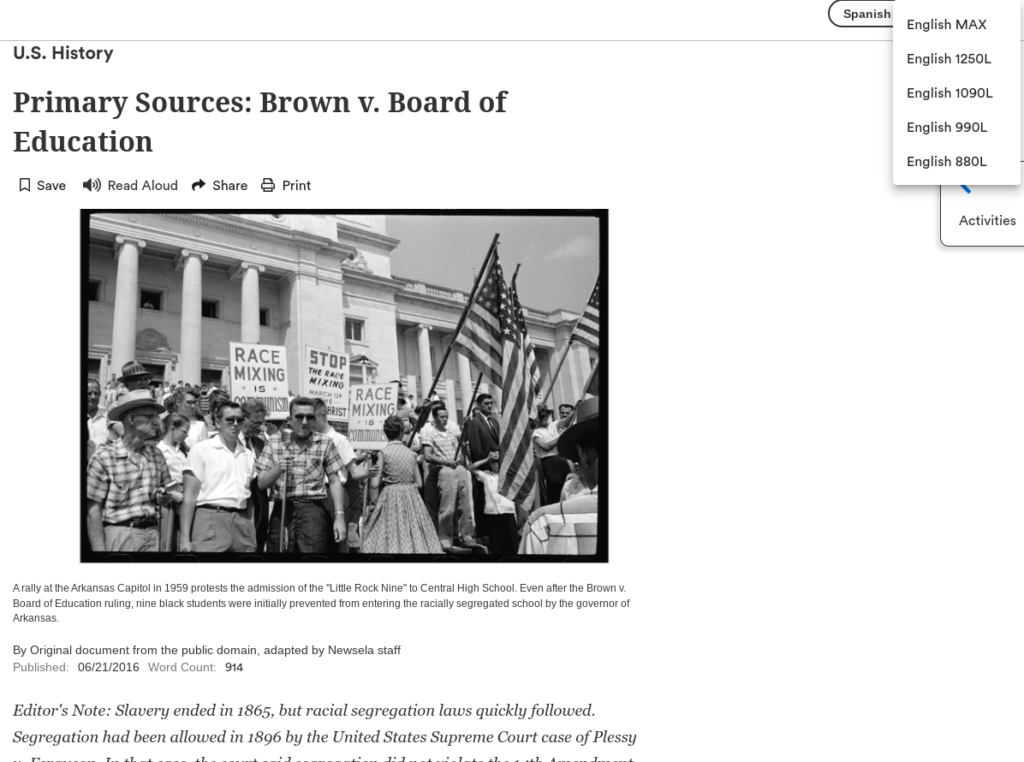
And the volume and range of the articles means there’s always something interesting to read, including numerous articles on law and government. Plus, the even more amazing thing is they have content beyond news articles–e.g., the Constitution, the Declaration of Independence, all of the Federalist Papers, Brown v. Board of Ed, Plessy v Ferguson–all written at 5 different levels of difficulty! On top of all of that, Newsela has an app, so you can do all this great reading right on your phone.
2. Legal English Textbooks/Online Courses
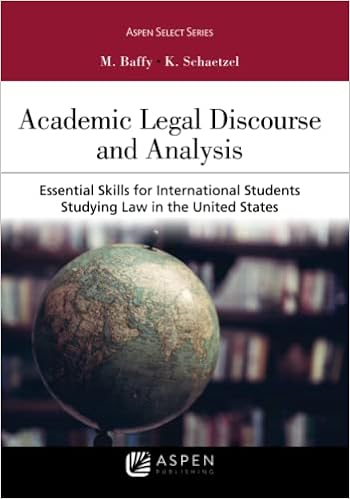
- Academic Legal Discourse & Analysis: Essential Skills for International Students Studying Law in the United States by Marta Baffy and Kirsten Schaetzel (both former Georgetown Legal English faculty) might be the best book out there. It teaches US legal system fundamentals, case reading and briefing as well as exam writing and other helpful topics, but in ways that are scaffolded for LLM students. It’s also a ready-to-use curriculum you can use that breaks into two semesters. A series of related negligence cases (torts) for one semester. And a series of 10 criminal procedure cases (Miranda warnings, custody, interrogation) for a second semester. There’s really nothing else like this book. And also no one else quite like the team of Marta Baffy (now at U of Baltimore Law), who has both a JD and a PhD in applied linguistics, and Kirsten Schaetzel (now at Emory Law School) who has a PhD in applied linguistics.
- *****************************

- Practical Legal English: Writing as a U.S. lawyer by Craig Hoffman, West Academic (2019). Prof Hoffman is a Georgetown Legal Writing professor who also has a Phd in Applied Linguistics and is the founder and head of Georgetown Law’s Legal English Program. This book is based on his legal writing curriculum for LLM students and incorporates discourse analysis in an extremely effective way to help international students learn to write in the context of US law school and legal culture. Here’s an article titled “Using Discourse Analysis Methodology to Teach Legal English” by Prof. Hoffman that explains his philosophy which underlies his course and book (and which opened up my own thinking early in my legal English career.)
- *****************************
- Georgetown Online Legal English: (1) Orientation to the US Legal System & (2) Reading Cases (Beta version) (Note: The Georgetown OLE courses are only available in Georgetown’s Canvas system which means they are currently only available to admitted Georgetown LLM students who have a Georgetown ID because there’s no way to access the system without a Georgetown ID.)
- USLawEssentials Law & Language online legal English courses, created by Daniel Edelson in collaboration with Stephen Horowitz. Includes short do-it-yourself courses and lessons on Legal English Vocabulary as well as instructor-led legal English courses.
- Legal Writing & Legal Skills for Foreign LLM Students by Prof. Karen Lundquist of the University of Minnesota Law School. (Prof. Lundquist also now has her own online legal English and legal writing consulting website.) I have yet to use this text, but it’s a terrific project-based approach to helping non-native English speakers with their legal writing and comprehension.
- *****************************
- Practical English Language Skills for Lawyers by co-authors Natasha Costello and Louise Kulbicki, published by Routledge – Published in 2023, the book is very focused on not just the substantive legal topics that lawyers encounter but also the soft skills such as client communications. The authors are both UK-trained attorneys and the book does a nice job of capturing many of the differences between US and UK legal English. For more info and to see some of the features of the book, you can watch a recording of the pre-book launch webinar on YouTube.
- American Legal English: Using Language in Legal Contexts (Michigan Series in English for Academic & Professional Purposes) by Charles Hall, Susan Barone, Susan M. Barone, et al. – This was the original and first-ever legal English textbook focused on preparing students for US law school. And the authors are all established experts in the English for Academic Purposes field. This would not be my first choice because it doesn’t match with my own teaching style and approach and experience. But it’s also very well thought out easy and clear to use and definitely not a bad book to work with. It also has some great materials in it that any instructor can use in a variety of ways.
- *****************************
- US Legal Reasoning, Writing, and Practice for International Lawyers by Prof. John Thorton of Northwestern University Pritzker Law School. (Side note: John was an expert academic ESL teacher for a number of years before going to law school, becoming a lawyer and then a legal writing professor at Northwestern!)
- *****************************
- How to Write Law Exams: IRAC Perfected by S.I. Strong & Brad Desnoyer. Thanks to Prof. Lindsey Kurtz for sharing this one! She comments that one of the great features of this book is it includes model answers written by both a law professor and a law student, and it can be very helpful to see the difference. This ties in with the idea of the benefit of legal English students getting lots of exposure to writing by “average law students.”
- *****************************
- Fundamentals of US Law by William Fernholz and Jodi Collova – This recently published (2022) book “introduces LLM students to the common law method of case analysis through concentrated study of topics in Tort and Constitutional Law. Fundamentals of U.S. Law teaches the “how” of legal practice in the United States. Students learn how to read cases, synthesize rules from reasoning, apply those rules to novel situations, and predict how the law may develop. The authors, two experienced lawyering skills instructors, use a half dozen fascinating and controversial topics to teach the signature skill of the common-law case method.” (Thanks to Anya Grossman for the info about this book.)
- *****************************
- Represent Yourself In Court and The Criminal Law Handbook, both by co-authors by Paul Bergman and Sara J. Berman, published by Nolo, which is widely known for its do-it-yourself legal manuals. Written as pro se manuals, for many law students, the books serve as easy-to-read, practical primers on civil and criminal court processes.
- Other suggestions? What did this list miss? Email me or post in the comments below.
3. Other Potentially Helpful “Legal English” Textbooks
Some textbooks that weren’t created to be legal English textbooks but that I’ve found helpful for exactly that purpose in my teaching:
- Law 101: Everything You Need to Know About American Law by Jay M. Feinman, published by Oxford University Press. A number of LLM students over the years have mentioned they’ve found this book helpful.
- Street Law: Understanding Law and Legal Issues, Student Edition (Civics & Government) – Intended for high school students as a practical guide to US law, government, and civics. But great for non-native English speaking lawyers and law students because it is rich in law-related vocabulary and US legal system concepts, it’s easier to read than a law school textbook, and it has a great glossary in the back of the book.
- Street Law organization website: Street Law started as a curriculum, then became a book, and now is a whole organization that has a number of other materials that I haven’t yet had time to examine from a legal English teaching perspective. But I think there are some intriguing offerings.
- Legal Analysis: 100 Exercises for Legal Mastery, Practice for Every Law Student by Cassandra L. Hill & Katherine T. Vukadin – The critical thinking exercises in the beginning make for great legal writing practice–legal style writing questions but self-contained so no actual law needs to be learned first to work on the writing. (Note: This is the book where I found the “Jogger-Banana Peel” question that I’ve used as the cornerstone of legal English writing courses I’ve taught.)
- Critical Reading for Success in Law School and Beyond by Jane Bloom Grisé, West Academic Publishing – This is a well-regarded book in community of law school academic support professionals (ASP). It’s not written with non-native English speakers or international students in mind. But it’s great pedagogy and materials that, in the hands of a more advanced student or a legal English instructor, can be very helpful in a legal English context.
- Scholarly Writing for Law Students: Seminar Papers, Law Review Notes and Law Review Competition Papers, Elizabeth Fajans & Mary R. Falk – Recommended by many colleagues as a great book for any students interested in academic legal research and writing.
4. Law Study Guides
In US law school, students often buy study aides to help supplement their understanding of cases and areas of law:

The “Short and Happy Guide to…[law subject]” series published by Westlaw seems to be the preferred series of LLM students I’ve worked with and the relatively easiest to read/comprehend. (i.e., relatively speaking, perhaps least amount of background/cultural knowledge needed to comprehend.)
5. Law-related novels (i.e., legal reading for enjoyment)
The best way to improve your reading and vocabulary in general is to read things you enjoy reading. (It’s a scientific fact!) So if you want to read some great stories about law and lawyers and American legal culture, see below:
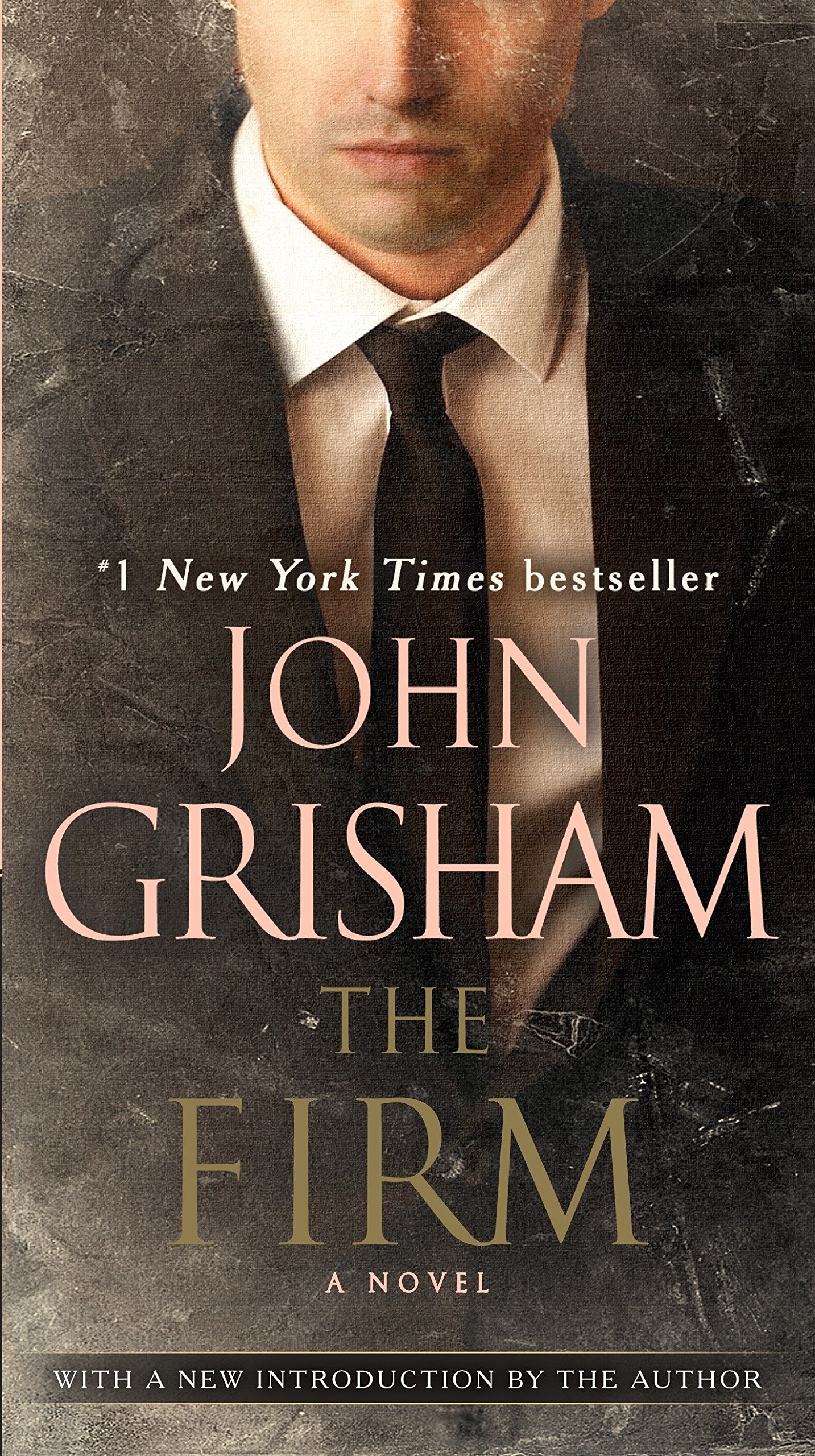
- Any novel by John Grisham, the great lawyer-novel author
- The Firm
- The Pelican Brief
- A Time to Die
- The Client
- The Chamber
- The Rainmaker
- The Runaway Jury
- The Street Lawyer
- And many others!
- A Civil Action by Jonathan Harr, the basis for the movie of the same title starring John Travolta. It tells the story of a personal injury lawyer who takes on a water contamination case and battles both large corporations and his own ego in his efforts to bring justice.
- The Buffalo Creek Disaster: How the Survivors of One of the Worst Disasters in Coal-Mining History Brought Suit Against the Coal Company- And Won by Gerald M. Stern – This book is often required reading for first-year law students at many US law schools. An amazing story of a lawyer’s role in representing a group of survivors from a tragic mining disaster in a lawsuit against the mining company. In addition to being relatively easy to read compared to other law-related books, the story takes readers on a wonderful tour of the American legal system and legal culture as well as exposure to a variety of fields of law .

- One L: The Turbulent True Story of a First Year at Harvard Law School by Scott Turow – The first-ever and most famous book about law school. This is *the* book that I and several generations of law students read before starting law school.
- Just Mercy: A Story of Justice and Redemption by Prof. Bryan Stevenson. A very popular and powerful book frequently read by law students before and/or during law school. “Just Mercy is at once an unforgettable account of an idealistic, gifted young lawyer’s coming of age, a moving window into the lives of those he has defended, and an inspiring argument for compassion in the pursuit of true justice.”

- Unbillable Hours by Ian Graham – A young law firm’s associate’s first-hand account of working for a law firm.
- Freedom for the Thought that We Hate: A Biography of the First Amendment by Anthony Lewis
- Encyclopedia Brown: Boy Lawyer – A series of books about a 10-year-old kid who solves crimes big and small by noticing one or two things that no one else notices. You get a chance to guess at the end of each story. And then you can look at the answer on the next page. These will not teach any doctrinal law, but they’re fun to read, a lot easier than regular legal reading, and can be tied into legal thinking and are a great way to get students reading a lot in English. Note: There are other series that imitate or are variations on this idea. I just don’t know the names of any of them.
- Theo Boone: Kid Lawyer – A series written by John Grisham but for kids and teenagers, so it’s a little easier to read.
- Tax Law
- A Fine Mess: A Global Quest for a Simpler, Fairer and More Efficient Tax System by T.R. Reid. A very readable look into tax systems around the world and the cultural and other factors that have led the U.S. to such a complicated system in the face of all good advice and reason.
- The Whiteness of Wealth: How the Tax System Impoverishes Black Americans—And How Can We Fix It by Georgetown Law professor Dorothy A. Brown. In the words of Carl Davis on the JusTax Blog, Prof. Brown’s book uses a mix of data, legal scholarship, interviews, and personal stories to tear down the myth that our tax system is neutral with respect to race.
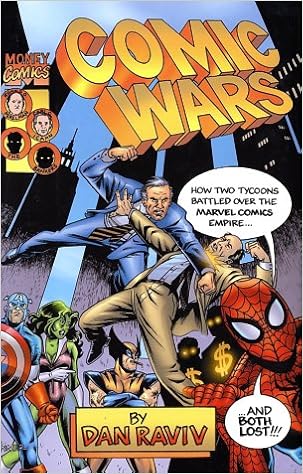
- Corporate Law
- Eat What You Kill: The Fall of a Wall St Lawyer by Georgetown Law professor Milton Regan. This book has a lot of bankruptcy in it. But it’s not a bankruptcy book. It’s about legal ethics in the era of the big law firm. And the first couple of chapters also give I think the best perspective on the history of the law firm in the US.
- Comic Wars: How two tycoons battled over the Marvel Comics Empire…and both lost by Dan Raviv. The battle between corporate raiders Ron Perelman and Carl Icahn for control of Marvel Comics.
- Courting Failure: How Competition for Big Cases is Corrupting the Bankruptcy Courts by Prof. Lynn LoPucki. My favorite part of the book is the first chapter which is actually not at all about bankruptcy but about the late 1800s race to the bottom between New Jersey and Delaware to become the favorite place for corporations to legally establish themselves. It reveals so much about America and about our legal system.
- Many more! Suggestions always welcome.
6. Law-related Movies
Watching law-related movies is always a great way to improve legal English while learning about American legal culture. Here are some of the best law-related movies out there:

- A Civil Action (Note: A great movie that’s actually based on a terrific book that is a true story written by the lawyer who is the main character.)
- The Firm (based on the John Grisham novel)
- Legally Blonde
- My Cousin Vinny
- The Verdict
- The Runaway Jury (based on the John Grisham novel)
- 12 Angry Men
- To Kill A Mockingbird (though some of my students said they found it very hard to follow the dialogue)
- Many more! Suggestions always welcome.
6A. Law-related TV Shows
- Suits
- Jury Duty (Amazon)
- Anatomy of a Fall
- Juror #2
*Special thanks to Legal English Professor Bythia Louzoun for getting the TV category going on here!
7. Law-related Podcasts
Some of these are easier to follow and understand than others. And there are new law-related podcasts coming out every day. But here are some that I like and that may be helpful for students–especially those with a stronger command of English.
- USLawEssentials Law & Language Podcast – (In China, use this link or this link.) A podcast by Daniel Edelson and Stephen Horowitz created specifically to help non-native English speaking lawyers and law students improve their legal English. Episodes alternate between “What’s New in the Legal News” and “Multilingual Lawyer Interviews.”
- Law Professor Podcast Directory: A list of podcasts by law professors, created and kept up-to-date by Prof Michael Madison of University of Pittsburgh Law School and producer of the The Future Law Podcast.
- COURTSIDE with Neal Katyal – Katyal is a Georgetown Law professor and frequently appears as a guest legal commentator on CNN and other news shows.
- Civics101 – An NPR podcast with a wonderful and engaging series of short episodes on all the things about government US students are supposed to learn in high school. Slight downside: It’s intended for an American audience, so some cultural references may affect comprehension.
- HowILawyer.com – Georgetown Law Professor Jonah Perlin interviews various lawyers about how they practice law, their writing process, how they find opportunities, etc. Great for anyone who is planning to be a lawyer. The language is conversational, moves quickly, and has various cultural references that may be hard for non-native English speakers to follow. But transcripts are available.
- StudyLegalEnglish.com – By legal English teacher and podcaster Louis Kulbicki, founder of the website StudyLegalEnglish.com, with an emphasis on UK law and contract drafting.
- Hidden Verdicts (by Jeff Brown) – “Hidden Verdicts uncovers forgotten legal cases that shaped history, presented in an engagingly unforgettable way. Hosted by Jeff Brown, a lawyer and proud Actors’ Equity member, this podcast offers a fresh perspective on the law, making complex topics accessible and fun for all ages and educational levels. Join us as we explore the stories behind the cases that changed America.” (Thanks to Bythia Louzoun for this recommendation!)
- Lawfare Podcast: Great discussion and explanation of current topics in the legal news, often with an emphasis on national security issues.
- The Just Security Podcast: No commercials or other fanfare. Just really thoughtful, clear discussion and explanation of legal topics by extremely knowledgeable and well-informed people, generally relating to national security and foreign policy. The podcast is an offshoot of the Just Security online forum and website, which always has excellent content.
- Advisory Opinions: Great discussion and explanations of current topics in the legal news. Hosted by David French and Sarah Isgur.
- The Democracy Paradox: A political science podcast, but great perspective on the notion of societies that rely on the concept of “rule of law.”
- Dissed: “Supreme Court dissents have it all: brilliant writing, surprising reasoning, shade, puns, and sometimes historic impact. Although they are necessarily written by the “losing” side, they’re still important: they can provide a roadmap for future challenges or persuade other justices. Sometimes they’re just cathartic. In Dissed, attorneys Anastasia Boden and Elizabeth Slattery dig deep into important dissents, both past and present, and reveal the stories behind them. Twitter: @EHSlattery @Anastasia_Esq @PacificLegal Email us at Dissed@pacificlegal.org”
- Business Scholarship Podcast by Prof. Andrew Jennings of Brooklyn Law School, recommended by a former Stanford LLM student from Brazil now practicing in Legal & Compliance.
- Contract Teardown – In each episode, two lawyers pick a contract (e.g., Kanye West’s contract with his producers), review it, and talk about what’s good and not so good in it from a contract drafting perspective. If you go to the website, there is a transcript for each episode plus a PDF of the contract that they discuss.
- Law Disrupted: A podcast hosted by John Quinn, founding partner of Quinn Emanuel Urquhart & Sullivan LLP, one of the top US law firms. Very different than any other law podcasts I’ve encountered, Quinn brings on guests and they always do an excellent job of analyzing “the latest evolution of law in the face of today’s most pressing issues.” Episodes I’ve appreciated include “Quinn Emanuel’s Pro Bono Work for Ukraine Against Russia,” “Litigation Practice in Delaware Chancery Court,” “Section 1782–US Style Discovery for Cases in Foreign Courts,” “Johnny Depp Trial Strategy and Tactics” with Camille Vasquez who was Depp’s lead counsel, “Human Rights in the Business World,” and “US/China Audit Access Agreement – What’s Next?“
- The Cutting Edge: Current Issues in White Collar Crime and Corporate Governance (produced by Columbia Law School): “Hosted by Professor John C. Coffee Jr. with Judge Jed S. Rakoff, this podcast series explores current issues in white collar crime and corporate governance with a focus on those that involve significant ethical and professional issues.”
- The Moth Storytelling Hour – Not directly about law. But so much of US law actually involves storytelling. And this always has great stories told by real people to a live audience. Stories are sad, funny, moving, thought provoking, and generally fun and very engaging. Storytelling is such an important part of being a lawyer, and this is a great way to listen to great storytelling while improving your English and cultural knowledge.
- Business Wars – Each episode is a re-enactment by voice actors of an actual business war, (e.g.,eBay vs PayPal; Hersey v. Mars; Bacardi vs Pernod Ricard; Southwest Airlines vs American Airlines; etc.) The style creates a story that is fun to listen to. And the language is spoken clearly and not so fast. Additionally, it’s scripted rather than improvised conversation, so that makes it more comprehensible as well for non-native English speakers.
- Legal Ethics in the News – NYC Bar Association – Two lawyers, Stephen Gillers and Barbara S. Gillers (who I’m guessing are married to each other) discuss legal ethics issues making headlines in the legal or mainstream media.
- It Was Said (by historian John Meacham) – An examination of some of the most powerful,impactful and timeless speeches in American history.
- The Animal Law Podcast with Mariann Sullivan – The animal law discussions are very interesting. But each topic they discuss is also actually a good explainer of regular law, whether that’s administrative law, criminal law, tort law, or other areas of law.
- Strict Scrutiny – Three female law professors–Leah Litman, Melissa Murray and Kate Shaw–discuss the Supreme Court and the legal culture that surrounds it. This is a fantastic podcast, but definitely more challenging for non-native English speakers as it moves quickly and makes many cultural references as well as legal cultural references.
- Uncommon Law – Produced by Bloomberg News, this podcast has very thoughtful looks into current issues in the legal world. They’re doing something no other law-related podcast seems to be doing, and they’re doing it well. “[Un]Common Law is the place where public policy, legal issues, and storytelling collide. That means sometimes we dive into the weeds on the biggest legal, government, or tax stories; examining a single topic or big idea, and reporting it out in a multiple episode series or special single episode. Hosted by Adam Allington.”
- The Jury Is Out: A Podcast for Trial Attorneys – By The Simon Law Firm, P.C., this podast has over 400 episodes on US trial practice and the civil litigation system, including “12 Tips for Opening Statement,” “Selecting Expert Witnesses,” “The Effect of COVID-19 on Juror Attitudes,” etc. And it’s mostly two lawyer colleagues having a conversation about the topic which makes for very authentic, conversational speech which is helpful for language development and listening practice.
- Lawyers Behaving Badly: “Two longtime lawyers, Jenn and KP talk about lawsuits in the news, current events, and of course, lawyers behaving badly.” It definitely requires a more advanced level of English as they frequently jump between formal and sophisticated language and informal language with lots of cultural references. But the discussions are fantastic because they look at real life situations and then identify and discuss the potential legal issues. It’s also just a fun podcast that strikes a nice balance between entertainment and learning.
- Mitnik’s Brushstrokes: Tort law and litigation from the perspective of a very charismatic, entertaining and strategic plaintiff’s side lawyer, Keith Mitnick. A rather different perspective on American law and practice (and vocabulary) than you get from a casebook. From his website: “Learn the art of outsmarting from the defense’s worst nightmare himself, Keith Mitnik. Join the star litigator each month as he shares his “trial nuggets” — proven trial preparation exercises that can block the defense and turn a case in your favor — in his new podcast, Keith Mitnik’s Brushstrokes.” BONUS: Great practice for listening to a southern US accent!
- Tax Notes Talk: For those of you interested in tax law, or thinking about pursuing a tax LLM. From the podcast website, “A weekly discussion of cutting-edge developments in tax, including up-to-the-minute changes in federal, state, and international tax law and regulations.”
- Legal Talk Network – A central podcast that pulls episodes from a range of law-related podcasts including:
- ABAJournal: Modern Law Library – Discussions with authors of books about law.
- ABA Law Student Podcast
- Above the Law: Thinking Like a Lawyer
- Lawyer 2 Lawyer
- ABAJournal: Asked & Answered
- @theBar
- legal talk today
- Sidebar – Co-hosts law school deans Jackie Gardina and Mitch Winick invite lawyers, authors, law professors, and expert commentators to discuss current challenges to our individual constitutional and civil rights. Educators at heart, this “dynamic dean-duo” believe that the law should be accessible to everyone . . . and should never be boring!
- Legal Toolkit
- New Solo
- Un-Billable Hour
- Kennedy-Mighell Report
- Lawyerist Podcast
- ABAJournal: Modern Law Library – Discussions with authors of books about law.
8. Legal English Articles
The following articles about legal English may be helpful to both those seeking to learn legal English as well as those teaching legal English.
- “Using Discourse Analysis Methodology to Teach ‘Legal English’,” Hoffman, Craig, “Using Discourse Analysis Methodology to Teach “Legal English”” (2011). Georgetown Law Faculty Publications and Other Works. 1332. https://scholarship.law.georgetown.edu/facpub/1332
- “Parse the Sentence First: Curbing the Urge to Resort to the Dictionary When Interpreting Legal Texts,” Hoffman, Craig, Legislation and Public Policy, Vol. 6:401 (2003).
- “Beyond Contrastive Rhetoric: Helping International Lawyers Use Cohesive Devices in U.S. Legal Writing,” Baldwin, Elizabeth R., 26 Fla. J. Int’l L. 399-446 (2014).
- “Unlocking Complex Grammar: 4 Steps for Reading and Writing” by Heather Weger and Julie Lake, TESOL Connections, pp. 1-7 (Aug. 2021).
- “Identifying spoken technical legal vocabulary in a law school classroom,” Bancroft-Billings, Sandra, English for Specific Purposes, 60 (2020) 9-25.
*****************
9. Vocabulary Resources
- iWeb Corpus – A fantastic resource to help anyone with their vocabulary, legal and other. In particular, if you look up a word, the iWeb Corpus provides a page of extremely helpful info about the word. Not just a definition, but links to pronunciations of the word, synonyms, frequent collocations, clusters (my favorite section), and a long list of examples of the word actually be used. This is the ultimate example of what it means “to know a word”: Not just the definition but all the other info you need to use it. Additionally, you can look up phrases and strings of words, which can give non-native speakers of English a concrete way to figure out if it’s ok to use a word or phrase a certain way.

BONUS: Here’s a short video tutorial I created back when I was at St. John’s Law titled “Legal English Vocabulary Strategies & the iWeb Corpus” on creative ways for LLM students to use the iWeb Corpus to their advantage.
Legal English: Practical ways for LLM students to use the iWeb Corpus from steven horowitz on Vimeo.
2. USLawEssentials Glossary of Legal English
This glossary not only contains every legal English term used in every article on this legal English learning site. When you look at a legal English term in the glossary, it also gives you a list of all the “Related Articles” in which that term appears. In other words, in addition to the definition, you can also then easily see multiple examples of the term being used in context.
3. USCourts.gov glossary of legal terms* – A comprehensive list of legal English vocabulary and definitions through the lens of the courts.
4. FindLaw’s Glossary* – FindLaw is a site that helps people find a lawyer anywhere in the US.
5. American Bar Association (ABA) Glossary*
6. Nolo’s Dictionary of Law Terms* – Nolo.com is a self-help legal resource, so a lot of the terms are included to be helpful to non-lawyers trying to understand or deal with a legal problem.
7. Concord Law School’s Glossary* – Great for law school-specific terms and vocabulary
8. South Carolina Bar’s Law Related Education Glossary*
*#s 3 through 8 taken from a list organized by Brian Sites of University of Miami Law School and shared with the Academic Support Professionals listserv.
*****************
10. Grammar Resources
Grammarism.com – A combination of free and non-free online do-it-yourself grammar activities and printable PDF worksheets. “197 Topics – 15,074 Tests/Worksheets – 313,291 Exercises.”

Elements of Success (by Anne Ediger, et. al.) – Books 1 through 4 – These books take a very unique and practical approach to grammar–completely different than whatever you think you know about learning grammar. They focus on communicative purpose (i.e., the kinds of things you want to be able to communicate) and then help you understand the grammar options you have and need to understand in order to help you achieve your communication goals.
*****************
11. Extensive Reading Resources
Newsela.com – As described above, a fantastic and easily accessible source for extensive reading.

The Week Junior – This is a printed publication you can subscribe to. (I know because my kids get it and they love it.) It’s aimed at school-age kids in the US, but it’s also a terrific extensive reading source for anyone trying to improve their academic English. It’s short summaries of news from the week–all easy to read, which is ideal for building vocabulary and reading speed as well as background knowledge. And it’s thin, light, and easy to take with you anywhere.
Voice of America: Learn English — Kind of like Newsela. Lots of articles to read on a wide range of subjects, written in English at different levels. Listening resources as well.
News in Slow English – Exactly what the name says! A great listening (and reading) resource for improving vocabulary, reading speed, and background knowledge in a fun and engaging way.
DOGONews: ELA – Science – Social Studies – News-like articles that are easy to read. It’s aimed at kids, but the articles are genuinely interesting and engaging. And if you’re interested, then you’ll read more. And that’s the whole point and value of extensive reading.
12. Pronunciation Resources

The below list was organized by Carolyn Quarterman, Lecturing Fellow for English for International Students at The Graduate School at Duke University, in response to a discussion of pronunciation resources on the Consortium for Graduate Communications (CGC) listserv during Fall 2022.
- Youglish: Youglish.com
- Tools-to-go: tfcs.baruch.cuny.edu/about-tools-to-go
- Rachel’s English: https://rachelsenglish.com/
- Pronuncian.com: American English Pronunciation: https://pronuncian.com/
- EnglishAccentCoach.com
- https://www.speechace.com/ (Students can’t utilize the entire program without a subscription, but they can complete the diagnostic test and some exercises.)
- ELSA Speak app (https://elsaspeak.com/en/ )
- “Just to be Clear” podcasts – https://jtbc.baruch.cuny.edu/category/episode/ (Each episode focuses on a different aspect of learning and teaching spoken English.Accompanying each episode are online practice materials for building fluency, vocabulary and listening skills.)
- USLawEssentials Law & Language Podcast (which Stephen Horowitz started with co-host Daniel Edelson) was created to be an extensive listening resource involving current and high-level topics. The speakers intentionally talk in a way that is natural but also graded for non-native English speakers to make it more easily understandable. The podcast provides a good volume of comprehensible input which is helpful for ear training which in turn can be very helpful for pronunciation improvement.
- “Business Wars”- Another podcast that may also be helpful from a comprehensible input/extensive listening perspective is a podcast called Business Wars.
13. Listening Resources
- “Understand Fast Speech in English: A 20-Day Challenge” – a series of YouTube videos by English with Jennifer that help students become aware of things that make listening in English difficult (e.g., connected speech; glottal stops; reduced words; unstressed vowels; etc.) (This recommendation comes via Prof. Karen Schwelle who specializes in English language communication for engineering students at Washington University in St. Louis.)
- Any recordings (audio or video) that use English spoken in a natural way and have transcripts or subtitles. Even better if you can adjust the listening speed, e.g., on YouTube or with a podcast. And ideally on a topic that is already familiar so that you can focus on training your ear and not spend time looking up vocabulary and deciphering meaning. In fact, reading and understanding a transcript first and then listening is a great way to train your ear and improve your listening.
14. Other Legal English-related Resource Pages
- 2022-02 EATAW Law Resources for website updated.pdf – by Dr. Jeannette Regan, Academic Writing Coach, Editor, and Instructor Impasse du Siau 5, 1462 Yvonand, Switzerland jregan@bluewin.ch – From the PDF: “In 2014, I compiled this list with the kind help of Carolina Serna, Thomas Williams, James Hartley, Lisa Ganobcsik-Williams, and Karin Lach, fellow members of EATAW (European Association for the Teaching of Academic Writing). I updated this list in February 2022 with EATAW members Auli Ek, Stephen B. Horowitz, Hans Malmström, who kindly, quickly, and enthusiastically added to it.”


